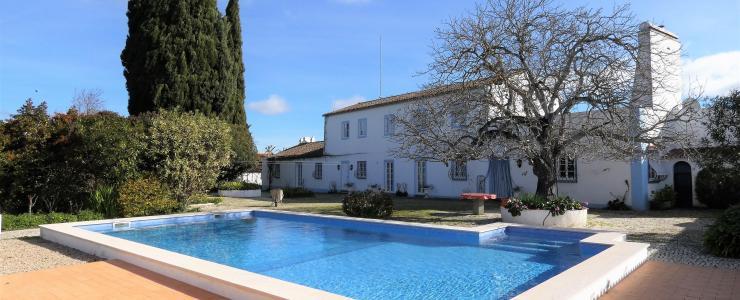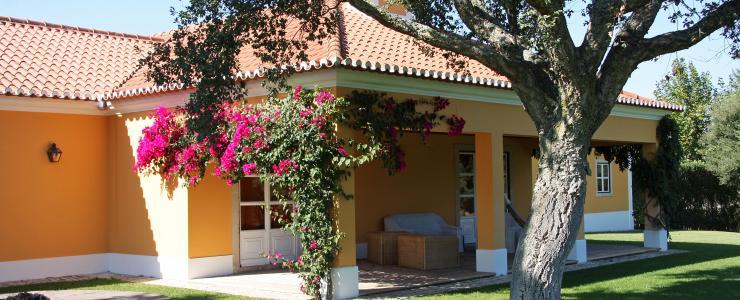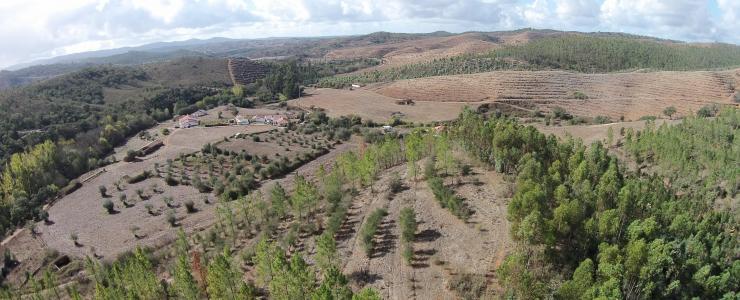Buying a forest in Portugal
Article written by Patrícia Viana and Manuel Andrade Neves
Law firm: Abreu Advogados - Lisbon
‘Silva’ is the most common surname in Portugal and it comes from the Latin ‘silva’, which means ‘wood, forest, grove, arboretum, orchard, tree’. This gives some indication of the importance of the forest in Portugal. In fact, the Portuguese forests were almost wiped out by intensive deforestation over the centuries, and things only began to be remedied in the late 19th century and, most notably, from the 1940s onwards with the creation of a special Forest Fund. Today, the Portuguese forest covers about 3,200 million hectares. Forest ownership is mainly private (almost 85%) with the lowest figure in Europe for public ownership (15%).
Land investment in Portugal
Today Portugal provides favorable conditions for land investment, particularly with the lack of restrictions on the ownership of real estate and rental.
The quality of the country's infrastructure, the stable democratic political system and overall good value-for-money, plus healthy return on investment are all positive factors encouraging investment in Portugal.
Real estate is thus a key sector in in the country.
This trend first became apparent in the residential sector, where the temporary residence permit for investment (Golden Visa) and non-habitual resident status (RHN) programs have contributed significantly, as has the growth in tourism, especially in Lisbon and Porto. The vitality in Portuguese real estate market was next felt in the commercial sector, attracting strong international investment.

However, the real estate sector that is currently booming in Portugal is the forest and agricultural property niche.
Buying and selling
In Portugal, the negotiation process for the purchase and sale of a property usually begins when the potential buyer or seller submits a contractual offer.
However, there is no obligation, because it is possible to proceed directly to establish a final sale and purchase agreement. In most cases, the parties sign a preliminary contract sets out the main clauses of the final agreement. The signature of a preliminary contract usually implies the payment of a deposit, equivalent to between 10-30 % of the final price.

The following documents are mandatory for the signature of preliminary contracts for the purchase and sale of forest and/or agricultural properties:
- Valid passport or other identity document;
- Portuguese tax identification number (NIF) or Portuguese legal entity tax identification number (NIPC);
- Proof of payment of the municipal property purchase tax (Imposto Municipal Sobre Transmissão Onerosa de Imóveis -IMT) and the stamp duty (IS);
- Certificate of title of ownership from the Land Registry for the property;
- Tax certificate for the property.
 Agreements on the purchase and sale of real estate may not be made orally (even for the preliminary contract). Any purchase and sale contract shall only be valid if signed before a Notary, or by private deed certified by a lawyer or by the land registry. The preliminary purchase and sale contract must be formalized in a document signed by both parties and must bear the notary’s authentication of the respective signatures.
Agreements on the purchase and sale of real estate may not be made orally (even for the preliminary contract). Any purchase and sale contract shall only be valid if signed before a Notary, or by private deed certified by a lawyer or by the land registry. The preliminary purchase and sale contract must be formalized in a document signed by both parties and must bear the notary’s authentication of the respective signatures.
Once the notarial deed or private document has been certified, the acquisition must be registered for disclosure and security purposes. Any breach of the purchase and sale agreement, i.e. the failure of the intended purchaser to enter into the final contract, will result in the loss of the deposit paid to the intended seller; in turn, if the intended seller is at the origin of the breach, the intended purchaser will be entitled to twice the amount paid as a deposit. Otherwise, either of the non-defaulting parties may request judicial fulfilment of the contract.
Taxes applicable to the purchase and sale of real estate
The most common ways of acquiring a property in Portugal are through the direct purchase and sale of the property or through the acquisition of shares in companies that own the property in question.
The acquisition of forest and/or agricultural property in Portugal is, in most cases, subject to the payment of the municipal property purchase tax (Imposto Municipal Sobre Transmissão Onerosa de Imóveis -IMT), calculated on the transaction price or the tax value of the property, whichever is higher, at a rate of 5%.
The ITM Code also provides for other situations which, for tax purposes, are equivalent to real estate transactions and are therefore subject to the payment of this tax, such as, for example, the granting of irrevocable powers of attorney conferring the right to sell the property or even cases where a lease has been extended for a period of 30 years or more.
Once certain legal requirements have been met, it is possible for the acquirer to be exempt from the LMI.
The acquisition of real estate is also subject to the payment of Stamp Duty, a rate of 0.8%, calculated on whichever is higher: the transaction price or the tax value of the property.
The ITM and the Stamp Tax must be assessed and paid before conclusion of the contract for the purchase and sale of the property; the purchaser of the property is generally liable for assessment and the respective payment.
Taxes on property ownership
 Property ownership in Portugal is subject to the payment of the municipal property tax (Imposto Municipal sober Imóveis - IMI), applicable to the tax value of rural buildings with a rate of 0.8% for forest and/or agricultural properties. This rate is 7.5% for real estate owned by companies whose registered office is included on the list of low-tax territories (tax havens).
Property ownership in Portugal is subject to the payment of the municipal property tax (Imposto Municipal sober Imóveis - IMI), applicable to the tax value of rural buildings with a rate of 0.8% for forest and/or agricultural properties. This rate is 7.5% for real estate owned by companies whose registered office is included on the list of low-tax territories (tax havens).
IMI is assessed annually and due by taxpayers registered as owners on 31 December of the respective year.
Non-habitual residence (RHN)
Portugal began to be promoted as an investment destination in 2009 with the approval of the RNH regime. Since this scheme’s introduction and up to present, a number of improvements have been made to it, and it is now characterized by its lack of administrative formalities.
Registration as a non-habitual resident is accepted by the tax and customs authorities, provided that the following conditions are met:
- The taxpayer must not have been domiciled in Portugal for tax purposes in the previous 5 years;
- The taxpayer must be domiciled for tax purposes in Portugal, complying with the tax domicile criteria provided for by Portuguese law, in particular: residence in Portugal for more than 183 days, consecutive or intermittent, over any 12-month period; or residence for a period shorter than that previously indicated, having a dwelling under conditions suggesting an intention to maintain it and occupy it as a main residence – able to purchase or rent a property (the law does not set down any conditions as to the type of law applicable to the property used as main residence).
Once the conditions listed above have been met, the taxpayer may register as RHN before March 31 of the year following that in which they become a tax resident. This regime is valid for 10 years (non-renewable), which may be interrupted when the taxpayer, for any reason whatsoever, leaves Portugal and resumed from the moment they resume their status as a tax resident in Portugal, for the remaining period.

Once registered as a non-habitual resident in Portugal, the taxpayer will benefit from advantages regarding the taxation of their income, depending on their actual situation.
Although we cannot pre-empt the analysis of each specific case, the tax benefits that typically make this regime attractive are as follows:
- Income received in Portugal from activities legally qualified as high value added, whether employed or self-employed, benefits from a reduced tax rate of 20%.
Other types of income, when received from a Portuguese source, are taxed at the general rates provided by Portuguese law for tax residents;
- Income received abroad from paid employment may be exempt from tax in Portugal, provided that it is declared in its country of origin;
- Income received abroad, derived from self-employment from a legally qualified activity with high added value, as well as any other type of income such as dividends, interest or royalties, may benefit from a tax exemption in Portugal, if the income can be declared in its country of origin (even in the absence of effective taxation);
- Pension income paid by a foreign entity may be exempt from tax, both in Portugal and in the country where the paying entity is located.
In view of these characteristics, this scheme is particularly suitable for foreigners and national citizens who are not resident in Portugal, who receive income from activities legally considered to be of high added value and who receive pensions received abroad.
Abreu Advogados
Founded in 1993, Abreu Advogados is one of the largest law firms in Portugal, with close on 200 lawyers for a total of over 300 employees.
Abreu Advogados has offices in Lisbon, Porto and Madeira and a strong international presence, with eight agencies in Angola, Brazil, Cape Verde, China, France, Iran, Mozambique and East Timor.
As an independent firm, Abreu Advogados promotes institutional links with various international law associations (AEL, Consulegis, IBA, INSOL EUROPE, Gesica, Multilaw, UIA, among others) and law firms in other jurisdictions.








